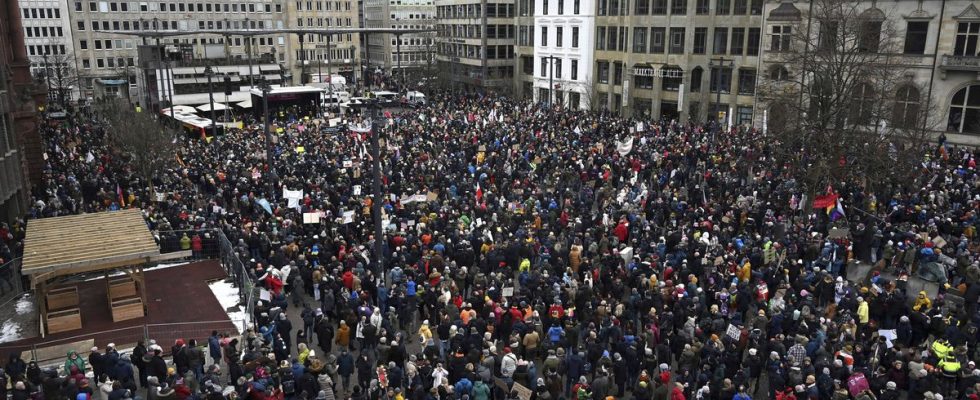“Nazis out” or even “Never again, it’s now”: these are the kind of signs that accompanied the tens of thousands of demonstrators on Sunday in Germany against the far-right AfD party and its radical ideology.
The influx was so great in Munich in Bavaria that the planned march in the streets of the Bavarian capital had to be interrupted. Organizers said 50,000 people turned out, twice as many as registered. Other estimates put the figure higher, up to 200,000 people. The police, for their part, estimated the crowd.
Some 250,000 people had already gathered across the country in dozens of cities on Saturday, according to estimates by the ARD channel. In Frankfurt, the center of German finance, 35,000 people marched to “defend democracy”.
Calls to gather on Sunday were launched in around forty cities such as Berlin, Munich and Bonn but also in more modest localities. In Dresden, capital of the state of Saxony, a stronghold of the anti-migrant and anti-system Alternative for Germany (AfD) party, a demonstration is also organized. In Cologne, organizers estimated the crowd at 70,000 people on Sunday, while in Bremen, local police counted 45,000 demonstrators in the center.
Plans for mass expulsion of foreigners at the origin of this mobilization
The mobilization testifies to the shock caused by the revelation on January 10 by the German investigative media Correctiv of a meeting of extremists in Potsdam, near Berlin, where, in November, a plan for mass expulsion of foreigners or foreigners. Foreign origin has been discussed. Interior Minister Nancy Faeser went so far as to estimate in the press that this meeting was reminiscent of “the horrible Wannsee Conference”, where the Nazis planned the extermination of European Jews in 1942.
Among the participants were a figure from the radical identity movement, the Austrian Martin Sellner, and members of the AfD. Martin Sellner presented a project to send back to North Africa up to two million people – asylum seekers, foreigners and German citizens who would not be assimilated -, says Correctiv.
This revelation shook Germany as the AfD continues to advance in the polls, a few months before three important regional elections in the east of the country where voting intentions for the far-right party are even higher than in the rest of the country.
The anti-immigration movement confirmed the presence of its members at the meeting, but denied adhering to the “remigration” project led by Martin Sellner.
“The Republic rises”
Many political leaders, including Social Democratic Chancellor Olaf Scholz, who took part in a demonstration last weekend, have stressed that any plan to expel people of foreign origin is an attack on democracy.
Mr Scholz called on “everyone to take a stand – for cohesion, for tolerance, for our democratic Germany”.
“The Republic is rising,” commented the weekly Spiegel on its website after Saturday’s rallies. Anti-AfD demonstrations have taken on a daily rhythm for a week. From Friday to Sunday, around a hundred rallies were planned.
Politicians, religious representatives and coaches from the Bundesliga, the German football championship, have called on the population to mobilize against this party, currently at its highest in voting intentions.
German President Frank-Walter Steinmeier said on Sunday that the demonstrators “give us all courage”. “They are defending our republic and our constitution against their enemies,” he said in a video message.
The AfD has taken advantage in recent months of the population’s feeling of dissatisfaction resulting from a new influx of migrants into the country and the permanent quarrels between the three parties of the government coalition, in a context of economic recession and inflation high.
The far-right party, which entered Parliament in 2017, has firmly established itself in second position in voting intentions (around 22%) behind the conservatives while the government coalition of Olaf Scholz with the ecologists and the liberals faces record unpopularity. In its strongholds in the former GDR, the AfD even tops opinion polls with more than 30%.
Six months before the European elections, several EU countries are facing a surge from the far right which could upset the major balances of the European Parliament.

